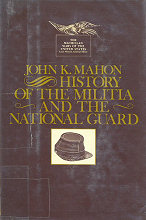
MAHON : History of the Militia and the national Guard (fülszöveg)
The Minutemen. The Richmond Light Infantry Blues. The Rough Riders. The Fighting 69th. Divisions called Yankee, Dixie, Old Hickory, Buckeye. These units have won an indelible place in our military heritage. They were, like scores of others, composed of volunteer citizen-soldiers of the militia and the National Guard it later became.
And in this volume in the acclaimed Macmillan Wars of the United States series, John K. Mahon provides a richly detailed, compelling history of America's irregular army. Here are three hundred years of a noble experiment--the idea that Americans would volunteer freely to bear arms in defense of the nation, so that we would avoid the dangers of a large, professional military.
A distinguished historian, Mahon examines every aspect of the militia system, with lively narrative skill and keen insight into the shifting balance of power between professional military establishment and the supporters of the militia. Woven throughout the book are the combat exploits of "the armies of the states, "a fascinating mosaic of bravery and valor, and the cruel lessons taught by asking untrained, poorly led, under-equipped, and often unwilling men to fight. The record of the militia and Guard units is, for perhaps the first time, faced with thorough objectivity. In every mass war, volunteers fought superbly. The exploits of Guard units in the trenches of World War I prompted an officer to note that "The American militiaman, when he is properly led, is the finest soldier who ever wore shoe leather." Other chapters were not so noble, and Mahon examines the divisive effects of Guard units as they stormed picket lines, shot at striking miners, and became house armies of governors seeking to counter national policies.
On the homefront, the story of the militia and the Guard it became is a tangle of conflicting interests, ambitions, and political power. From Whig and Federalist to the ongoing struggles between the military establishment and the powerful National Guard Association, Mahon unravels the winners and losers in the attempt to decide who shall defend our shores and who shall control our fighting forces.
The philosophical and ideological context of the military in America is brilliantly conveyed as well. We have been, Mahon shows, a nation without much of a regular army for a large part of our history. Samuel Adams's warning in 1776 that a standing army is "dangerous to the Liberty of the People" has been echoed time and again. Crucial issues of national defense have been submerged in pitched battles between the states-rights' supporters of the militia and those who believed in nothing less than a large, well-trained professional army. Just before and for years after the Civil War, there were far more militiamen than regular soldiers. The struggle continues, and Mahon takes us up to the era of the all-volunteer army and the role of today's Guard, which is more popular now than it has been in many years, as part of the total force in readiness.
Why has the militia system failed as our principal means of defense? Can the Guard be counted on to mobilize quickly and fight effectively? Is the existence of state Guard units, although largely funded by Washington, an anachronism? Or do they remain a secret weapon against militarism? Much more than fascinating military history, John Mahon's book is necessary reading for all those concerned with the strength of our armed forces, and our free society, today and in the future.